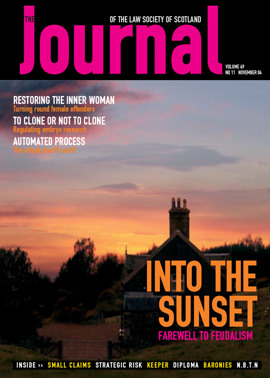Too far or not enough?
Responses to the Scottish Executive consultation paper “Improving Family Law in Scotland” have now been analysed. (See www.scotland.gov.uk/ library5/justice/iflcar-00.asp) These came from a broad spectrum. One area respondents were invited to comment on was additional parental rights and responsibilities (PRRs) for unmarried fathers, step-parents and grandparents.
Unmarried fathers: if you register
The responses received mostly supported conferring PRRs on unmarried fathers who jointly register their child’s birth. Individuals indicated 70% support with 23% against; 79% of organisations were positive with only 8% opposing.
Respondents gave a number of reasons in favour of this proposal. First, it could assist in abating the public perception of discrimination against unmarried fathers; secondly, it would reinforce the important role of fathers and encourage their participation in their children’s upbringing.
Various opposing views were also expressed, most commonly that unmarried fathers might enjoy parental rights without fully undertaking their responsibilities, and that conferring PRRs would not assist if a mother was refusing to allow contact. Furthermore, requiring a father to be present at the registration of the birth could present difficulties where the father worked abroad. A number of faith groups also objected that promiscuity would be encouraged, leading to the potential breakdown of the family unit.
In England, since 1 December 2003 when the Adoption and Children Act 2002 came into force (but not before that date), an unmarried father acquires parental responsibility if he registers as the child’s father at the registry office and his name is put on the birth certificate. It is noteworthy that research prior to the commencement date demonstrated that seven out of 10 people wrongly believed that a father automatically has a say in his child’s future, regardless of whether he is married. In view of this misconception and the historic legal differences between unmarried and married fathers, the Government funded a widespread campaign to publicise the new legislation. It is therefore imperative that any changes enacted in Scotland are widely publicised, to help alleviate the foreseeable difficulties of any lack of public awareness here.
Despite the reforms in England, it is clear from recent press coverage that there is a perception by some fathers that there are significant implementation issues of parental rights regardless of whether couples are or were married. Indeed, some pressure groups hold the view that the current proposals simply do not go far enough.
Step-parents: right for the child?
The Scottish Executive has also proposed the introduction of written step-parent parental rights and responsibilities agreements (SPPRRAs) as a way of ensuring that a step-parent can gain PRRs in terms of sections 1 and 2 of the Children (Scotland) Act 1995.
This also received considerable endorsement with 58% of respondents indicating support. Numerous reasons were cited. Significantly, the important role of the step-parent would be enhanced and the bond between step-parents and step-children strengthened, thereby strengthening the family unit. It was also considered important as assisting step-parents in practical matters, such as when a child requires emergency medical treatment.
Overall the proposal was seen as one which could help avoid costly, complex court proceedings. There was however some concern that it was driven by adult convenience rather than the best interests of the child. An oft stated concern was the importance of obtaining the views of the child and it is therefore essential that any legislative changes allow these to be taken into account.
Interestingly, the majority view also reflects the experience of Step Family Scotland, which has been lobbying for reform for some time now, based on their extensive practical experience and findings gleaned from their helpline.
Grandparents: best left voluntary
A majority 59% of respondents were of the view that a right to contact is not appropriate for grandparents and wider family members.
They took the view that, for such groups, voluntary arrangements are much more appropriate and more likely to be long lasting. Furthermore, complications were envisaged, such as a child being torn between loyalties to all the individuals entitled to exercise contact, and the right being open to abuse by parents who had been denied contact.
The general consensus was that contact with grandparents and the wider family would perhaps be better promoted by media campaigns to highlight public awareness of the benefits of such contact to children.
The future of PRRs
Many of these proposals have been in the pipeline for some time and it is a positive development to see them at last approaching the statute book. With the number of marriages in Scotland continuing to wane (down from 41,000 in 1951, to 29,600 in 2001) and 43 per cent of all births in 2001 being to unmarried parents (against just 8 per cent in 1971), it is vital that legislative changes are made to reflect the ever changing structure of Scottish society.
Anna McGovern and Lorna Gibb, Morton Fraser Family Law Team
In this issue
- Drafting consumer contracts
- Virtual firms: transactional learning on the web
- Ignorantia juris: it's all Greek to me
- Sheriff Court Rules Council consultation paper
- The Clinical Trials Directive - a summary
- Guarding the inner sanctum
- Neighbours in the global village
- Family law: is it the path for you?
- From sunset to sunrise
- What next for conveyancing?
- An ethical minefield
- Shredding the evidence
- Robbing the poor?
- Our dynamic profession
- A wider angle
- Keep the eye on the ball
- A rough guide to becoming a partner
- Rediscovering hope
- Sharpen your pencils
- Significant other
- Too far or not enough?
- Chipping away the infringers?
- View from Holyrood
- Website reviews
- Book reviews
- The Registers and the Appointed Day
- Feudal law: not just a relic
- Birth of a register






